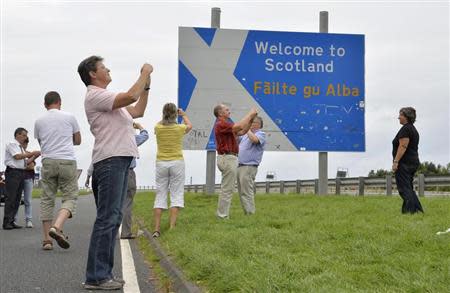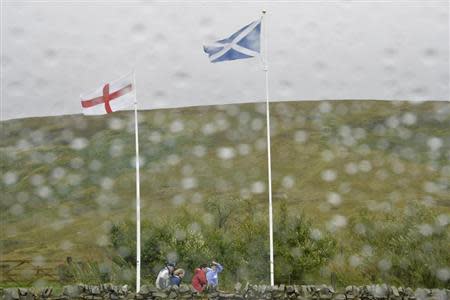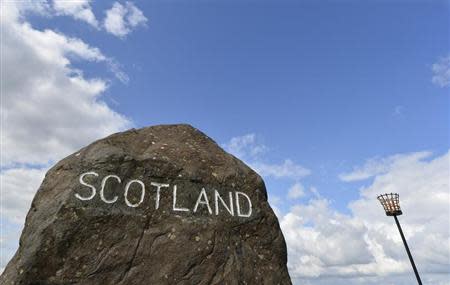Britain promises to honour all state debt as Scottish vote approaches
By Belinda Goldsmith and William Schomberg LONDON (Reuters) - Britain sought on Monday to reassure bondholders by promising to honour all 1.2 trillion pounds ($2.2 trillion) of UK government debt regardless of whether Scots vote for independence in a referendum this year. But with the terms of any Scottish breakaway yet to be defined, it was unclear how the Treasury would work out the "fair and proportionate share" of Britain's liabilities that it wants Scots to take on if they vote to end a 307-year-old union with England. The governments would also have to work out in detail the terms on which Scotland would reimburse the Treasury for its share of the debt and how it would raise the funds. Nationalist leader Alex Salmond said Scotland was willing to finance its share of the UK's debt as long as an independent Scotland also received a share of the UK's assets, including retaining the use of the British pound and the Bank of England as the lender of last resort. But Britain's government, which opposes Scottish independence, has said a currency union with an independent Scotland would be "highly unlikely". The Treasury's pledge on debt is intended to head off the risk that investors will demand higher returns to hold gilts - British government bonds - if Scots start to seem likely to vote to cut ties with England. The pro-independence camp is currently trailing the unionists in opinion polls. Even so, British officials including Scottish Secretary Alistair Carmichael have warned against complacency over the September 18 vote, wary of a re-run of the 2011 Scottish parliament election when the Scottish National Party won over undecided voters in the final weeks. Salmond, who holds the post of Scotland's First Minister, created after a vote for greater autonomy for the Scottish government in 1997, said any uncertainty in the gilts market had been caused by the UK government's refusal to discuss the terms of independence. Calling for negotiations to start, he said an independent Scotland was prepared to service its share of UK debt - as long as it was also given a share of the UK's assets. Britain's economy is enjoying a surprisingly strong economic recovery, and the government bond market has so far remained focused on how long it will be before the Bank of England decides it has to raise interest rates. "In the event of Scottish independence from the United Kingdom, the continuing UK government would in all circumstances honour the contractual terms of the debt issued by the UK government," the Treasury said in a statement. It said an independent Scotland would be responsible for "a fair and proportionate share" of Britain's liabilities with repayment terms subject to negotiation. DEBT FOR ASSETS Britain's net debt stood at nearly 1.2 trillion pounds at the end of the 2012-13 fiscal year and is forecast to reach 1.6 trillion pounds by 2016/17, when Scotland would become independent if its people voted 'Yes' in September. The Scottish government estimates Scotland would account for about 100 billion pounds of this debt or 6 percent. The debate over Scottish independence has come down to the economy and whether Scots would be better or worse off if they decided to break away from the rest of the UK. Salmond, leader of the Scottish National Party (SNP) that dominates the Scottish parliament, says independence would free his nation of five million people from decades of economic mismanagement. "The UK government, and the No campaign, would be well advised ... to accept our offer of sensible discussions," Salmond said in a statement. "For example, they should listen to the overwhelming majority of the people of England who polls indicate see the common sense of sharing a common currency." The pro-UK campaign say a critical weakness of the pro-independence campaign is its support for a sterling currency union with no guarantee that the rest of the UK would agree. Prime Minister David Cameron, whose right-leaning Conservative party is deeply unpopular in Scotland and holds only one of its 59 UK parliamentary seats, has rejected calls from Salmond for a debate about post-independence Scotland. Cameron's spokesman said on Monday: "Both sides have stated this expectation that an independent Scottish state would become responsible for a fair and proportionate share of the UK's current liabilities ... It (the promise to honour debt) was the right step." (Reporting by William Schomberg and Belinda Goldsmith in London and Abhirup Roy in Bangalore; Additional reporting by Andrew Osborn; Editing by Phil Berlowitz/Ruth Pitchford)



